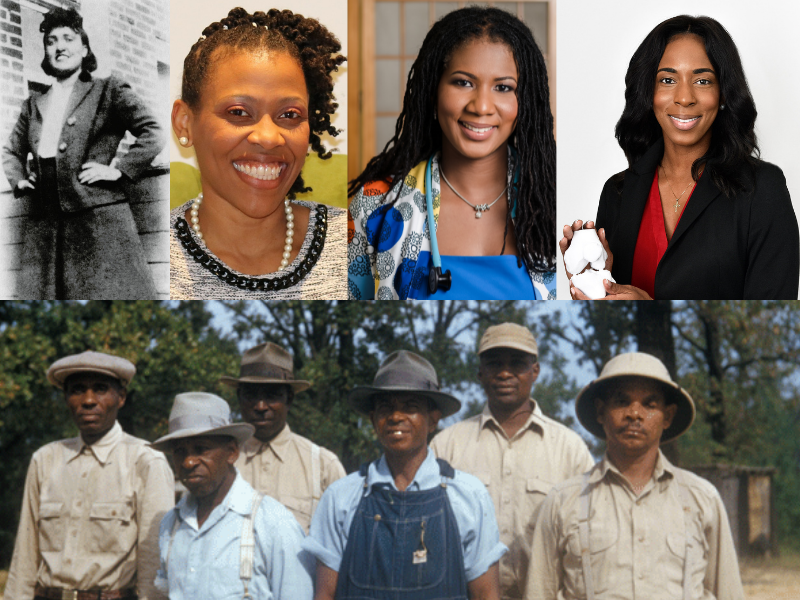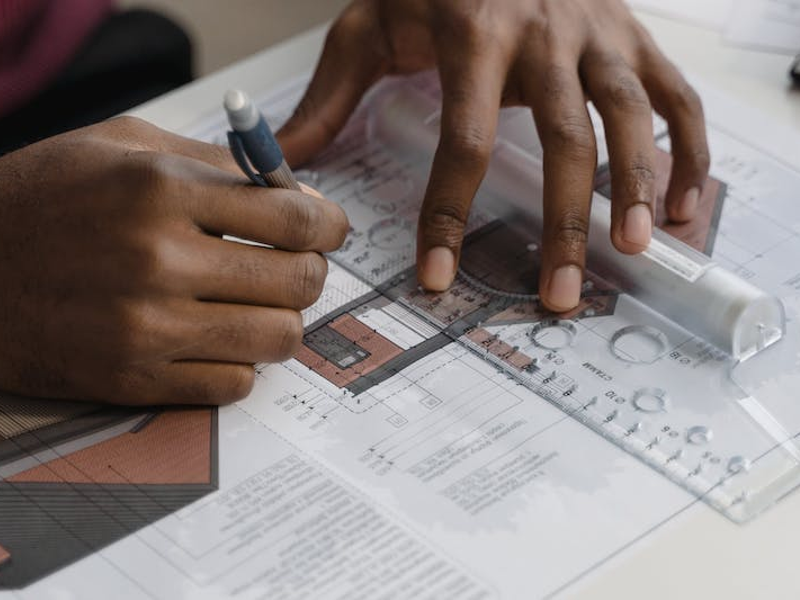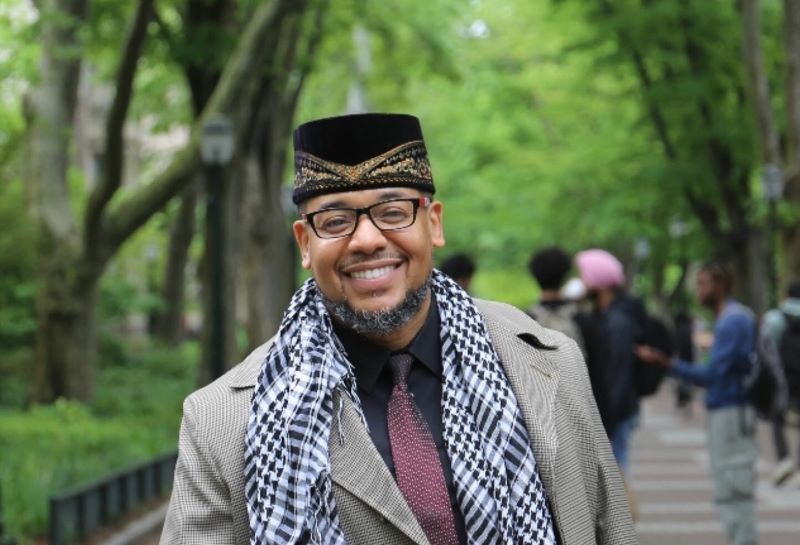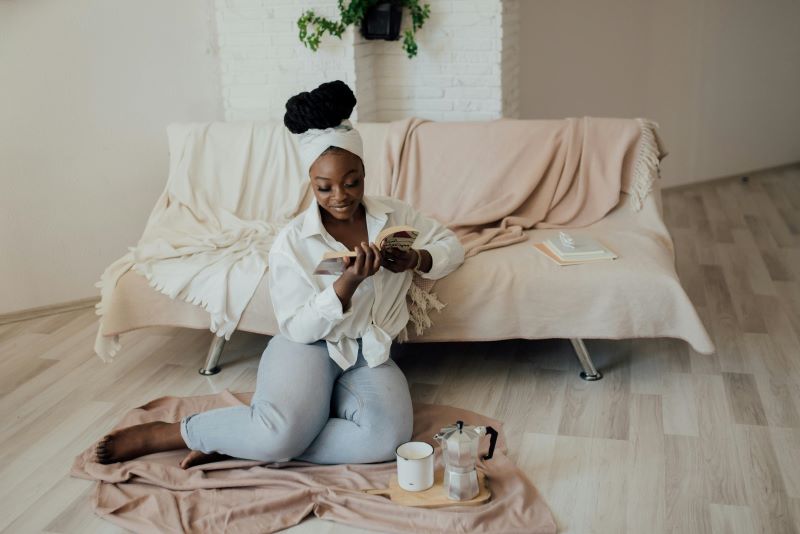Image Sources below
“When will our children go back to school? When will the healthcare system be able to perform elective surgeries freely – persons who require surgery have been delayed for almost two years – in addition to an already exhaustive waiting list. How much worse will our financial burden be? The sooner we get a handle of things, the better. But this cannot happen individually. We are as strong as our weakest link.” – Dr. Shanea Gibson-Hartey, doctor of Obstetrics and Gynecology
Racism in the United States healthcare system is an ongoing issue. In light of the racial disparities faced during COVID-19, FunTimes Magazine offers ‘Understanding COVID-19 Vaccine Hesitancy’, a three-part article series that explores the backdrop of COVID-19 vaccine hesitancy. In the first part of the series, FunTimes engages with medical professionals and historians to explore historical and cultural impacts on Black perceptions of vaccines, and ways to mitigate vaccine hesitancy.
The Center for Disease Control (CDC) reports that due to healthcare disparities, Black or African American and Latino or Hispanic communities are more likely to get serious illnesses and die from COVID-19, and that the aforementioned groups are less likely to be vaccinated. On January 10th, the Kaiser Family Foundation (KFF) reported that out of the vaccination data of 74% of the United States adult population, 60% of Whites were vaccinated, 54% of Blacks were vaccinated, 60% of Hispanics were vaccinated, and 81% of Asians were vaccinated.
Race-related disparities in relation to Black populations may be attributed to hesitancy, access, and historical injustices. Black people and the health industry have a shady past, littered with unethical experiments, injustice, and violations. The cycle of injustice that culminated in the race-related COVID-19 disparities have roots entangled with slavery and the subsequent eras of American history.
The Legacy of the Tuskegee Syphilis Experiments

( Participants of the Tuskegee Syphilis Study. Image by the Department of Education, Health and Welfare. Public Health Service. Health Services and Mental Health Administration. Center for Disease Control. Venereal Disease Branch (1970-1973) via Pingnews at Flickr)
The United States Public Health Service (USPHS) Tuskegee Syphilis Experiments, which occurred from 1932 to 1972, were a series of experiments in which 600 African American males were told they would be receiving ailment treatment, only to be given a placebo pill. Effects of this study included some participants losing their lives, eyesight, death, and more. The real intention of this study, which was to conduct post-mortem examinations on the effects of untreated syphilis, was not revealed to the participants.
Henrietta Lacks, and HeLa Cells as an Unethical Catalyst for Scientific Evolution

( Henrietta Lacks. Image by Oregon State University via Flickr )
Henrietta Lacks, a Black woman who died of cervical cancer in 1951, carried cells that continued to multiply even after her death. Her cells were taken by doctors without the knowledge, permission, or compensation of her family, and continue to be used for healthcare innovations, like the COVID-19 vaccine. In October 2021, Lacks’ son, Lawrence Lacks, was awarded a WHO award in honor of his late mother’s contributions to scientific advancement, in an attempt to atone for the medical misconduct that resulted in these innovations. The Lacks family continues to fight for reparations and sued Thermo Fisher Scientific for unlicensed use of Henrietta Lacks’ cells in October 2021. Ben Crump, the renowned lawyer who represents the Lacks’ family’s case, describes HeLa Cells as ‘Chattel property’ in the 21st century. Over 100 companies, a majority of them pharmaceutical companies, have reaped financial benefits from HeLa cells. Lacks’ family was not aware of HeLa cells until at least 20 years after they began to be used in 1951.

( Kwame Appiagyei-Opoku, lab technician and history enthusiast )
Kwame Appiagyei-Opoku is a Charlotte, North Carolina-based lab technician and history enthusiast who does COVID-19 testing for a living. In discussing the history of mistrust between descendants of the TransAtlantic Slave trade and the US medical system, Kwame says:
“We’ve come so far in terms of quality of life and technology at the expense of generations of marginalized people, such as Black descendants of slavery. The big picture lays out a pattern in which we see that healthcare providers don’t care about how Black bodies are treated in the name of scientific effectiveness and progress.”
In describing the relationship between Black people and medications, Kwame says:
“Medications and enslaved people in the United States do not have the best historical relationship, since doctors viewed the enslaved as goods and treated them harshly during examinations. There was also rampant experimentation on Black bodies. It doesn’t help that there are records of Black women not being given anesthesia during Cesarean sections, or that forced sterilization/eugenics was widespread until the 1980s.
These injustices have morphed into commonplace carelessness and a lack of empathy/care towards Black people today. Black women are currently two to six times as likely to die from childbirth. It’s really hard to tell a group of people to let their guard down after allowing a very valid narrative of ‘The healthcare system doesn’t care about you’ to build within the community.”
Kwame enlightens readers that the concept of an mRNA vaccine was created by a Black woman, Dr. Kizzmekia Corbett.

( President Joe Biden with Dr. Kizzmekia Corbett at the NIH Vaccine Research Center. Image by NIH Image Gallery via Pexels )
Dr. Kizzmekia Corbett, as a leading member of a National Institutes of Health (NIH) immunopathogenesis team based in Bethesda, Maryland, helped to design the vaccine sequence for what would become the 94.1% effective Moderna mRNA COVID-19 vaccine and also led to the 91.3% effective Pfizer mRNA COVID-19 vaccine. Currently, Dr. Corbett is an Assistant Professor of Immunology and Infectious Diseases at Harvard University.

( Dr. Shanea Gibson-Hartey, doctor of Obstetrics and Gynecology )
Philadelphia’s population, which was reported by the Pew Charitable Trusts to be 40% African American in 2021, has a vibrant Afro-Caribbean community. In 2017, Pew found that the third-highest immigrant population in Philadelphia hailed from Jamaica.
Dr. Shanea Gibson-Hartey, a Jamaica-based Doctor of Obstetrics and Gynecology, gives insight into reasons for COVID-19 vaccine distrust among Afro-Caribbean communities:
“With Afro-Caribbeans, there will always be a cultural belief regarding pharmaceutical companies versus herbal medicine, and a belief of ‘experimentation’ from the larger Caucasian population on Black communities. There are many who refuse, because the vaccine is very new, and some do not believe in SARS-CoV-2 itself. Many believe it is just the flu and that they themselves will not die from complications of it.”
In describing advice for health professionals to create awareness about the vaccine, Philadelphia’s population, which was reported by the Pew Charitable Trusts to be 40% African American in 2021, has a vibrant Afro-Caribbean community. In 2017, Pew found that the third-highest immigrant population in Philadelphia hailed from Jamaica.
Dr. Shanea Gibson-Hartey, a Jamaica-based Doctor of Obstetrics and Gynecology, gives insight into reasons for COVID-19 vaccine distrust among Afro-Caribbean communities:
“With Afro-Caribbeans, there will always be a cultural belief regarding pharmaceutical companies versus herbal medicine, and a belief of ‘experimentation’ from the larger Caucasian population on Black communities. There are many who refuse, because the vaccine is very new, and some do not believe in SARS-CoV-2 itself. Many believe it is just the flu and that they themselves will not die from complications of it.”
In describing advice for health professionals to create awareness about the vaccine, Dr. Gibson-Hartey reminds communities that the pandemic is not under control and that precautions like mask-wearing, handwashing, social distancing, and vaccines are necessary as the virus continues to mutate. She also says people will have multiple COVID-19 infections if they are not careful. “Vaccines have always been a part of primary prevention, as a means of battling the disease before you get it, so that you won’t have poor outcomes once infected”, says Dr. Gibson-Hartey.
Dr. Gibson-Hartey gives advice to Black communities regarding the COVID-19 vaccine:
“It is fair to have concerns regarding the vaccine. A forum should be created for persons to be able to discuss and be educated about this virus and vaccine. It should be in a trusting environment, without the burden of feeling embarrassed, ashamed, forced, or attacked. The Black community also needs to come with an open mind and be willing to grasp new concepts.
When will our children go back to school? When will the healthcare system be able to perform elective surgeries freely – persons who require surgery have been delayed for almost two years – in addition to an already exhaustive waiting list. How much worse will our financial burden be? The sooner we get a handle of things, the better. But this cannot happen individually. We are as strong as our weakest link.”

( Dr. Makini Mc-Guire-Brown, BSc, MBBS, MBA, Doctor of Family Medicine )
Dr. Makini McGuire-Brown, a Trinidadian-born, Jamaican educated, and Canada-based family medicine doctor, advises people to note that the vaccine is not about individuals getting vaccinated, but rather about the sum of the population becoming vaccinated for public safety. Dr. McGuire-Brown also says it is important for doctors to educate and talk to people about the vaccines in a language they will understand, and notes that this is why she created her blog, M. Parley, where she discusses medical topics in ‘sensible talk’, or language that people can understand. Dr. McGuire-Brown advises marketing messages to the masses to be more diverse, as some people learn through images or other mediums than writing.
On the topic of herbal medicines as COVID-19 remedies, Dr. McGuire-Brown says: “I remind people that herbal medicines are designed for long term health and solutions, while medicines like the COVID-19 vaccines are designed to fit urgent needs.”
In noting the effects of racism on vaccine hesitancy, Dr. McGuire-Brown says: “Because COVID vaccines were manufactured in the US and people hear about the injustices done to Black people, there is some hesitancy, although the situation in Canada in terms of race is different.”

( Dr. Naima Stennett, MD, Primary Care Sports Medicine, and Family Doctor )
Dr. Naima Stennett, a Jamaican-born, North Carolina-based Primary Care Sports Medicine and Family Medicine doctor, speaks on COVID-19 vaccine hesitancy among Black people:
“There is distrust regarding Black communities with the COVID-19 vaccine in part due to the historical context of the mistreatment of African Americans including the forced sterilizations of Black women. The distrust is also influenced by Black communities’ personal experiences of discrimination in the health care system including barriers to access health care, access to health insurance, and institutional practices that make it more difficult for Black Americans to obtain care.”
From her experience, Dr. Stennett notes that other frequent vaccine concerns were that the vaccine may infect them with the virus, the limited clinical data, and concerns about the side effects of the vaccine.
Dr. Stennett advises communities to seek COVID-19 and vaccine-related information from reputable sources like the Food and Drug Administration and the CDC and to keep asking questions about vaccine concerns. She also advises communities to “continue practicing safety measures including face masks, hand hygiene, and social distancing to protect yourself and the public against coronavirus.”
Representation in healthcare, including more Black people from multicultural backgrounds as doctors and in health care legislation may help to bridge the gaps in the United States and to drive empathy-inspired action in terms of vaccination and care. The Black Doctor’s COVID-19 Consortium in Philadelphia realized this and partnered with Philadelphia organizations to get more Black people vaccinated. Stay tuned for Part II of ‘Understanding COVID-19 Vaccine Hesitancy’, where we learn Black vaccination boosting strategies from the Black Doctor’s Consortium and their ‘Philly Vaxx Jawn’ initiatives.
Works Cited
https://jamanetwork.com/journals/jama/fullarticle/2775687
https://covid.cdc.gov/covid-data-tracker/#vaccination-demographics-trends
https://www.cdc.gov/coronavirus/2019-ncov/community/health-equity/vaccine-equity.html
https://www.theatlantic.com/health/archive/2018/04/j-marion-sims/558248
https://www.cdc.gov/tuskegee/timeline.htm
https://www.livescience.com/henrietta-lacks-hela-cell-lawsuit-thermo-fisher
https://www.washingtonpost.com/science/2021/10/13/henrietta-lacks-who-honored-vaccine-research
https://www.hsph.harvard.edu/profile/kizzmekia-s-corbett
https://www.yalemedicine.org/news/covid-19-vaccine-comparison
https://archive.org/details/storyofmylif00sims/page/242/mode/1up?view=theater
https://www.pewtrusts.org/-/media/assets/2019/04/philadelphia_state_of_immigrants.pdf
https://www.pewtrusts.org/-/media/assets/2021/04/philadelphia-2021-state-of-the-city.pdf
https://www.aljazeera.com/news/2021/10/14/who-honours-henrietta-lacks-for-her-world-changing-legacy
This article has been made possible by the Independence Public Media Foundation.

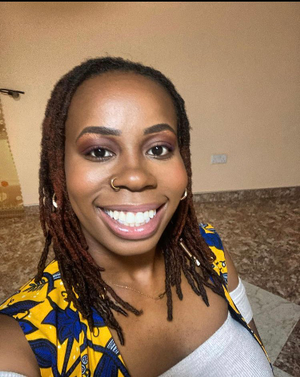
Nana Ama Addo is a writer, multimedia strategist, film director, and storytelling artist. She graduated with a BA in Africana Studies from the College of Wooster, and has studied at the University of Ghana and Kwame Nkrumah University of Science and Technology. Nana Ama tells stories of entrepreneurship and Ghana repatriation at her brand, Asiedua’s Imprint ( www.asieduasimprint.com ).

